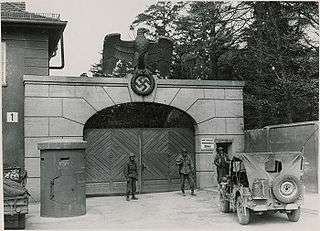Friedrich Reck-Malleczewen

Friedrich Percival Reck-Malleczewen (August 11, 1884 – February 16, 1945) was a German author. His best-known work is Diary of a Man in Despair, a journal in which he expressed his passionate opposition to Adolf Hitler and Nazism.[1] He was eventually arrested by the Nazis and died of typhus at the Dachau concentration camp.
Life and work
Friedrich (Fritz) Reck-Malleczewen was born on the estate of Malleczewen, Masuria (Maleczewo, Poland), the son of the Prussian politician and landowner Hermann Reck. He originally wanted to be a musician, and at one point studied medicine in Innsbruck. He served as an officer in the Prussian Army but was dismissed due to diabetes, and later married Anna Louise Büttner in 1908. They had three daughters and a son before divorcing in 1930.
Graduating in 1911, Reck was a ship's doctor, in American waters, for a year. Thereafter he moved to Stuttgart to become a journalist and theatre critic for the Süddeutsche Zeitung, moving to Pasing near Munich in 1914. In 1933 Reck converted to Catholicism, and in 1935 he married Irmgard von Borcke, with whom he had another three daughters.
Throughout the 1920s and 1930s, Reck was also a novelist, mainly of children's adventure stories. One book, Bomben auf Monte Carlo, has been filmed four times. Many of his books were banned by the Nazis, and more were not published until years after his death. Today his best-known work is Diary of a Man in Despair (Tagebuch eines Verzweifelten), his journal of life under Nazi rule (which he vehemently opposed). It was published for the first time in 1947, then republished in 1970 in English translation by Paul Rubens.
Arrest and death
Reck noted in his journal, in October 1944, that the Nazi authorities were becoming suspicious of him. On 13 October, he was arrested and charged with the serious offence of "undermining the morale of the armed forces," which could be punished by death on the guillotine. After some days in prison, he was released following the surprise intervention of an SS general.[2] However, he was arrested again on 31 December and charged with "insulting the German currency." This appeared to be the result of a letter he had written to his publisher, in which he had complained that the inflation rate was eroding the value of his royalties.[3] On 9 January 1945, he was transferred to the Dachau concentration camp, where disease was widespread. He soon became ill and an official death certificate stated that he had died of typhus on 16 February.
Bibliography
- Uradel, 1914
- Mit Admiral Spee, 1936 (written 1914/15)
- Aus Tsingtau entkommen, 1916
- Der Admiral der Roten Flagge, 1917
- Monteton, 1924
- Die Siedlung Unitrusttown, 1925
- Frau Übersee, 1926
- Liebesreigen und Fanfaren, 1927
- Die Dame aus New York, 1928
- Sven entdeckt das Paradies, 1928
- Jean Paul Marat, 1929
- Bomben auf Monte Carlo, 1930
- Des Tieres Fall, 1931
- Hundertmark, 1934
- Krach um Payta, 1935
- Ein Mannsbild namens Prack, 1935
- Sophie Dorothee, 1936
- Bockelson, 1937
- La Paloma, 1937
- Spiel im Park, 1937
- Der grobe Brief, 1940
- Diana Pontecorvo, 1944
- Das Ende der Termiten, 1946
- Charlotte Corday, 1947
- Tagebuch eines Verzweifelten, 1947 (Diary of a Man in Despair)
References
- ↑ Inaspaciousplace.wordpress.com
- ↑ Diary of a Man in Despair, Reck-Malleczewen (New York Review Books) 2000, p.212
- ↑ Diary of a Man in Despair, p.224
| Wikimedia Commons has media related to Dachau concentration camp. |